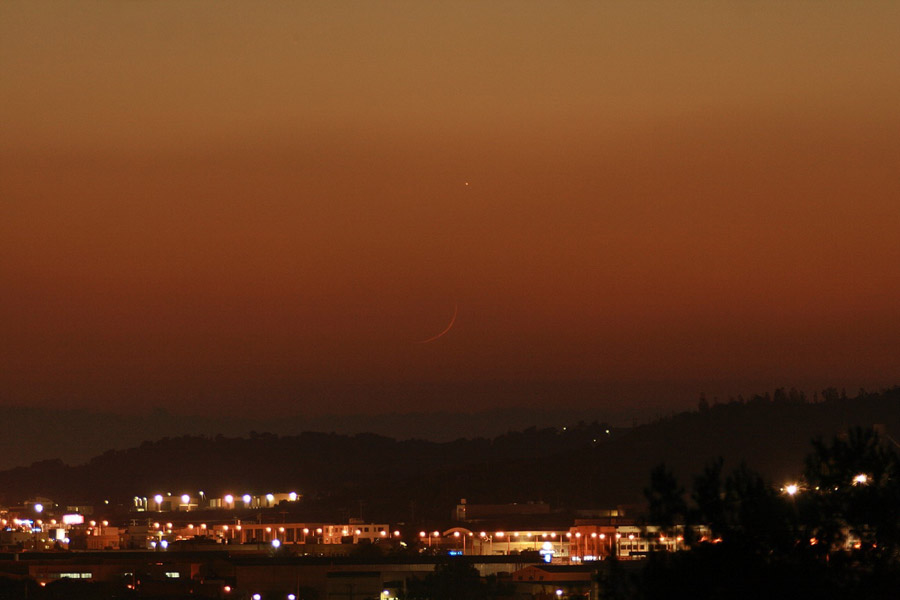Difference between revisions of "January 14, 2008"
| Line 3: | Line 3: | ||
<!-- ws:start:WikiTextHeadingRule:0:<h2> --> | <!-- ws:start:WikiTextHeadingRule:0:<h2> --> | ||
<!-- ws:start:WikiTextLocalImageRule:3:<img src="/file/view/Moon-MercuryLPOD.jpg/34892195/Moon-MercuryLPOD.jpg" alt="" title="" /> -->[[File:Moon-MercuryLPOD.jpg|Moon-MercuryLPOD.jpg]]<!-- ws:end:WikiTextLocalImageRule:3 --> <br /> | <!-- ws:start:WikiTextLocalImageRule:3:<img src="/file/view/Moon-MercuryLPOD.jpg/34892195/Moon-MercuryLPOD.jpg" alt="" title="" /> -->[[File:Moon-MercuryLPOD.jpg|Moon-MercuryLPOD.jpg]]<!-- ws:end:WikiTextLocalImageRule:3 --> <br /> | ||
| − | <em>image by [mailto:eliasastro@freemail.gr | + | <em>image by [mailto:eliasastro@freemail.gr Elias Chasiotis], Markopoulo, Greece.</em><br /> |
<br /> | <br /> | ||
| − | Elias is a sleuth of slender slivers of setting Moons. I like thin Moons because spotting them, especially unexpectedly, is such a delight. Elias usually includes a cultural foreground, but this time I want to link the Moon to the star in the sky that is over it. The "star" is one of the ancient Greek planets, the fleet-footed Mercury. The least known inner planet, Mercury has a [http://messenger.jhuapl.edu/ | + | Elias is a sleuth of slender slivers of setting Moons. I like thin Moons because spotting them, especially unexpectedly, is such a delight. Elias usually includes a cultural foreground, but this time I want to link the Moon to the star in the sky that is over it. The "star" is one of the ancient Greek planets, the fleet-footed Mercury. The least known inner planet, Mercury has a [http://messenger.jhuapl.edu/ Messenger] from Earth racing toward it, taking the first new images in 33 years today. Actually the imaging has already started with navigation images being taken to make sure the targeting is perfect. And the approach movie - showing Mercury growing in the field of view has started too. Over a period of [http://messenger.jhuapl.edu/encounters/index.php?autorefresh=false&time=1200274800&timestep=60 three hours] Monday afternoon (US east coast time) spectral images, laser altimetry, photometry and visible and color images will be acquired. Apparently, live images will be shown on the web starting at 17:43UT. So check your computer monitor but also go out tonight and look about 10° above the western horizon and let photons from Mercury impinge on your eyes as Messenger flies past it. And then turn your attention to our Moon, Mercury's closest relative, at least as far surfaces go, and image skimming over those cratered lands. <br /> |
<br /> | <br /> | ||
<em>Chuck Wood</em><br /> | <em>Chuck Wood</em><br /> | ||
| Line 12: | Line 12: | ||
9 January 2008, 16:06 UT, Canon EOS 400D, 70-200 F2.8 zoom lens, 2x converter.<br /> | 9 January 2008, 16:06 UT, Canon EOS 400D, 70-200 F2.8 zoom lens, 2x converter.<br /> | ||
<br /> | <br /> | ||
| − | <em>Now you can support LPOD when you buy ANY book from Amazon thru [http://www.lpod.org/?page_id=591 | + | <em>Now you can support LPOD when you buy ANY book from Amazon thru [http://www.lpod.org/?page_id=591 LPOD!]</em><br /> |
<br /> | <br /> | ||
<hr /> | <hr /> | ||
| Line 18: | Line 18: | ||
---- | ---- | ||
===COMMENTS?=== | ===COMMENTS?=== | ||
| − | + | Register, and click on the <b>Discussion</b> tab at the top of the page. | |
Revision as of 16:06, 11 January 2015
Voyage To a Twin World?

image by Elias Chasiotis, Markopoulo, Greece.
Elias is a sleuth of slender slivers of setting Moons. I like thin Moons because spotting them, especially unexpectedly, is such a delight. Elias usually includes a cultural foreground, but this time I want to link the Moon to the star in the sky that is over it. The "star" is one of the ancient Greek planets, the fleet-footed Mercury. The least known inner planet, Mercury has a Messenger from Earth racing toward it, taking the first new images in 33 years today. Actually the imaging has already started with navigation images being taken to make sure the targeting is perfect. And the approach movie - showing Mercury growing in the field of view has started too. Over a period of three hours Monday afternoon (US east coast time) spectral images, laser altimetry, photometry and visible and color images will be acquired. Apparently, live images will be shown on the web starting at 17:43UT. So check your computer monitor but also go out tonight and look about 10° above the western horizon and let photons from Mercury impinge on your eyes as Messenger flies past it. And then turn your attention to our Moon, Mercury's closest relative, at least as far surfaces go, and image skimming over those cratered lands.
Chuck Wood
Technical Details:
9 January 2008, 16:06 UT, Canon EOS 400D, 70-200 F2.8 zoom lens, 2x converter.
Now you can support LPOD when you buy ANY book from Amazon thru LPOD!
COMMENTS?
Register, and click on the Discussion tab at the top of the page.



